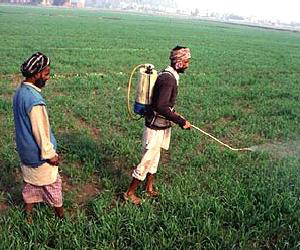The Punjab Government seems to have finally woken up to the need of having a census on farmers' suicides in the state. The state government, it is learnt, has the [sic] entrusted the arduous task of completing the census to the Punjab Agricultural University. As per Dr R.S. Sidhu, head of the Department of Economics, PAU, the state government has asked us to do the work and we have taken it up as a research project. Though whole of Punjab is to be covered under the study, the state government has asked us to do a pilot project in two districts of Punjab, Gurdaspur and Sangrur initially.
The census will be conducted by the Punjab Agricultural University (PAU), based in Patiala Ludhiana. During the first phase of the survey, PAU will conduct a door to door survey in about 1,500 villages in Gurdaspur and about 575 villages in Sangrur out of the 12,000 villages in Punjab. The report from this initial phase is set to be completed in four months from the beginning of the survey, which is set to begin in the next couple of weeks.
The census will take into account farmer suicides occurring after April 1, 2005, excluding suicides of farm laborers.
Rising pesticide and fertiliser costs, shrinking land holdings, declining soil fertility and heavily-subsidized farming in wealthier countries are some of the factors blamed for these suicides.
A related issue is the increasing rate of cancer stemming from excessive use of harmful pesticides since the Green Revolution (which other langarites have blogged about as well).

A comprehensive study conducted in the area by the prestigious Post Graduate Institute of Medical Education and Research (PGIMER), Chandigarh, brings out unequivocal evidence that the use of indiscriminate, indiscreet, excessive and unsafe pesticides is directly responsible for the rapid and significant rise in the number of pesticide-related cases of cancers and cancer deaths.
The PAU isn’t expected to have a perfect record to qualify to conduct the census, but I hope that it has at least stopped pushing farmers to use pesticides as it used to.
The PAU continues to push pesticides, knowing too well that these were not required in the first place. In the case of cotton, scientists have compounded the problem by turning the "insect profile" hostile, who, instead of being eliminated are breeding heavily. There were six or seven kinds of pests that worried the farmers in the 1960s; today, the number of cotton pests has multiplied to over 60, says Dutt.
Farmers have excessively used pesticides which have polluted the drinking water, upon bad advice from influential agricultural lobbies and profit sharks, which has led to high yield overruling health concerns.
Punjab has 2.5 per cent of the total agricultural land in the country, but is using the highest amount—more than 18 per cent of pesticides in the country. All this has contributed to widespread social devastation in individual and community life.
Other Asian regions have acknowledged the unnecessary and harmful effects of excessive use of pesticides.
Almost 40 years after the green revolution, the International Rice Research Institute, at Manila, in the Philippines, now publicly accepts its mistake in promoting pesticides. It is on record that pesticides were a waste of time and efforts†in Asia for the cultivation of rice.
"Organic farming" is slowly being introduced and used in very small scales in Punjab, but it is not yet widespread, unlike in other Asian neighbors.
Farmers in Bangladesh, Vietnam and the Philippines have successfully opted for pesticide-free cultivation. But the irony of Punjab is that the agriculture establishments are not open to this bitter realism about pesticides. They are still gloating in the green-revolution mindset, insulated from alternative paradigms for sustainable agriculture, environment and development.
Organic farming is being introduced mainly by ngos.
While NGO's such as Kheti Virasat Mission, are doing their best to educate the farmers about health and environment issues, even to the extent of asking them to pledge that they will do only organic farming, the state government’s role is starkly insensitive and lackadaisical.
But the effects of excessive use of pesticides and pollution of water have already taken root.
The train plying between Muktsar and Bikaner has been rechristened as the ‘cancer train’ by the locals.
Posted by Reema Wednesday, May 28, 2008 at thelangarhall.com
